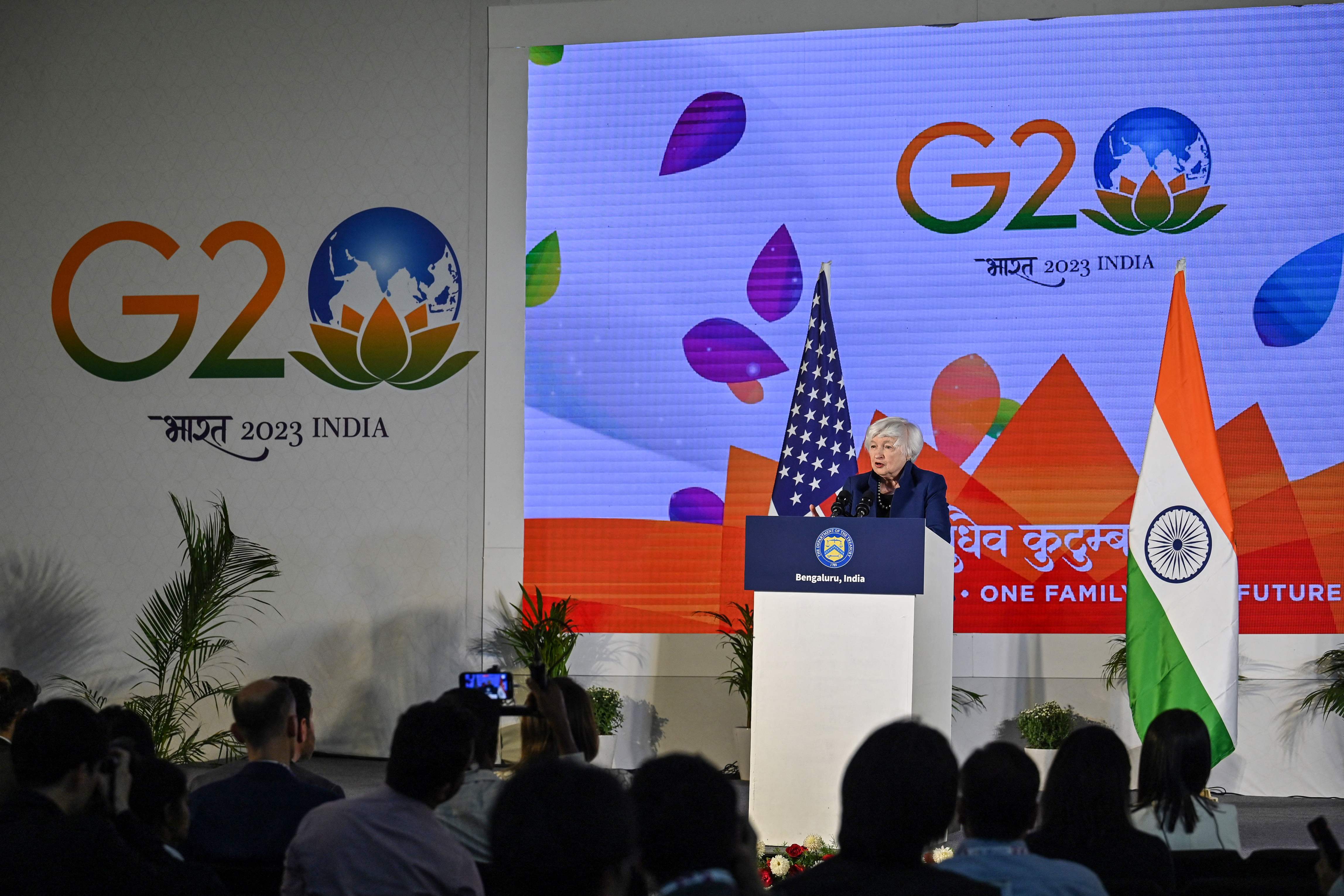G20 host India reluctant to call Russia’s invasion of Ukraine a ‘war’
US treasury secretary Janet Yellen insists on ‘strong condemnation of war’ in G20 communique
India’s officials have been reluctant to call the Russia-Ukraine conflict a “war” in joint communiques for the Group of 20 (G20) meetings that the country is chairing this year.
The officials failed to reach an agreement to term the conflict a “crisis” or a “challenge” instead of the word “war” while drafting a joint G20 communique on Wednesday in the first day of meetings in India’s Bengaluru, said delegates of at least seven G20 countries.
US treasury secretary Janet Yellen, who was present for the meeting, said “we would like to see strong condemnation of the war” in the G20 communique.
The move comes as India juggles between doing business with Russia and placating the West’s demands to be tougher on the US’s rival country.
The debate over Russia’s involvement in the G20 meetings and use of language to refer to the Ukraine invasion is expected to loom large on India’s other goals as G20 president this year.
The country’s current reluntance is a marked divergence from previous remarks made by India’s prime minister Narendra Modi in president Vladimir Putin’s presence, and the country’s foreign minister S Jaishankar.
Meeting Russian leader Vladimir Putin on the sidelines of the Shanghai Cooperation Organisation (SCO) summit in Uzbekistan late last year, Mr Modi had said “today’s era is not an era of war” in comments widely seen as a public rebuke of the powerful Kremlin leader.
Mr Jaishankar had previously said the war disproportionately hit poorer countries by raising the prices of fuel and food.
The latest move was also in contrast to the agreement reached by delegates at a G20 summit in Bali, Indonesia, which was attended by the Chinese president Xi Jinping and Mr Modi.
The neighbouring countries and rivals have taken a neutral stance to the war.
The G20 Bali statement said “most members strongly condemned the war in Ukraine” while acknowledging “other views and different assessments of the situation and sanctions”.

Delegates from at least seven countries who attended the meeting told Reuters that discussions concluded without a decision on how to describe the war.
Indian officials also resisted discussions on imposing additional sanctions on Russia in a meeting of finance ministers and central bank chiefs on the eve of the first anniversary of Russia’s attack on Ukraine.
“India is not keen to discuss or back any additional sanctions on Russia during the G20,” said one of the officials. “The existing sanctions on Russia have had a negative impact on the world.”
Another official agreed that sanctions were not a G20 issue. “G20 is an economic forum for discussing growth issues,” the person said.
The move has also come on the heels of Russia’s foreign minister Sergey Lavrov confirming his visit to Delhi to attend the G20 Foreign Ministers’ summit on 1-2 March. The minister will have several bilateral meetings on the sidelines of the G20 in India, Russian foreign ministry said.
India has set the G20 agenda to raise concerns of the Global South and depoliticisation of the global supply of food, fertilisers and medicine.
Jonah Kaplan, an intelligence and security analyst with geopolitical advisory firm Dragonfly, said discussions on Russia at the meetings “will probably be a point of contention between the West and India”.
“While the US has said India’s stance on sanctions on Russia is ‘deeply disappointing’, the West has generally taken a pragmatic approach to India’s military and economic relationship with Russia and are likely to continue doing so,” he told The Independent.
He said the US and its allies are “willing to make exceptions for India”.
“The US and her allies have identified China as their key geopolitical challenge and have continued to expand military and economic cooperation with India in the Indo-Pacific despite differing positions on relations with Russia,” he adds.
Meanwhile, US Treasury officials expect a discussion over debt relief for distressed countries to be “difficult”.
Officials gathered in Bengaluru said it was a key challenge for the G20 to overcome China’s demand for multilateral development banks to participate in debt relief by taking “haircuts” alongside bilateral creditors.
“The debt issues are challenging, I would say. They have been difficult the last several meetings and I expect they’ll continue to be,” one of the Treasury officials said.
Ms Yellen said the US will resume discussions with China on economic issues “at an appropriate time” and warned Beijing it would face repercussions if it helped Moscow evade American sanctions.
She said communication between the US and China was important for “the sake of the entire globe”.
Join our commenting forum
Join thought-provoking conversations, follow other Independent readers and see their replies
Comments
Bookmark popover
Removed from bookmarks